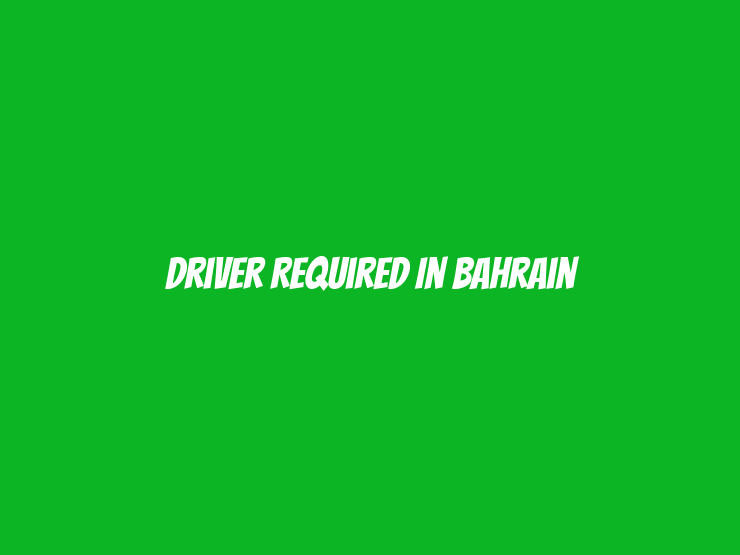A Driver is responsible for transporting goods, passengers, or materials safely and efficiently from one location to another. The role requires a high level of reliability, punctuality, and knowledge of the roadways. Depending on the type of driving job—whether it is for a company’s fleet, private hire, or public transportation—drivers are expected to handle various tasks such as loading and unloading goods, assisting passengers, and maintaining the cleanliness and condition of the vehicle.
Drivers must adhere to all traffic laws and regulations, ensuring that their driving is conducted in a safe manner. This position typically requires flexibility in working hours, including nights, weekends, and holidays, depending on the employer’s needs.
| Salary | Market Competitive |
| Experience | 1 Years |
| Location | Bahrain |
| Qualification | Basic |
| Posted | 05 October 2024 |
| Job Type | Full-Time |
| Posted by | Habeebi Recruiter |
| last date to apply | apply within 15 days |
Key Responsibilities
1. Transportation of Passengers or Goods
The primary responsibility of a driver is to transport passengers, goods, or materials to their designated locations. For passenger drivers, this involves ensuring a comfortable and safe journey, while for goods or delivery drivers, it includes timely and accurate deliveries.
- Transport passengers to and from destinations, ensuring their comfort and safety.
- Deliver goods and materials efficiently, adhering to schedules and instructions.
- Ensure all cargo is secured properly to avoid damage during transit.
2. Vehicle Maintenance and Inspection
Drivers are responsible for maintaining the vehicle they operate, ensuring it is in good condition and safe for use. This involves regular inspections, checking fuel levels, and reporting any mechanical issues that could affect the vehicle’s performance.
- Conduct routine inspections of the vehicle, checking tire pressure, oil levels, and brakes.
- Ensure the vehicle is clean and properly maintained.
- Report any mechanical issues or damages to the appropriate personnel.
3. Adherence to Traffic Laws and Regulations
Drivers must strictly follow all traffic laws and regulations, including speed limits, traffic signals, and safety protocols. This is crucial for the safety of both the driver and others on the road.
- Follow all traffic laws, regulations, and speed limits.
- Ensure compliance with any specific regulations related to commercial or passenger driving.
- Avoid distractions while driving, such as mobile phone use or other activities that can cause accidents.
4. Customer Service and Professionalism
For drivers who transport passengers or deliver goods to clients, customer service is an essential part of the job. This includes being courteous, punctual, and helpful, especially when assisting passengers with luggage or when delivering goods to customers.
- Provide courteous service to passengers, helping them with luggage or other needs.
- Communicate effectively with clients or customers regarding delivery times and any potential delays.
- Maintain a professional demeanor and appearance while representing the company.
5. Route Planning and Navigation
A driver should be familiar with their driving area and capable of planning routes that avoid delays due to traffic or road closures. Additionally, the use of navigation systems can assist in determining the most efficient routes.
- Plan and follow the most efficient and safe routes to reach destinations.
- Use GPS or maps to navigate unfamiliar routes and avoid traffic congestion.
- Adjust routes when necessary due to road closures, weather conditions, or traffic.
6. Safety and Emergency Procedures
Drivers need to be prepared for emergencies, such as vehicle breakdowns or accidents. They should know how to respond calmly and effectively, ensuring the safety of passengers or securing the cargo.
- Remain calm and act appropriately during emergencies such as accidents or breakdowns.
- Ensure that passengers are safe in the event of an emergency.
- Know how to perform basic troubleshooting and repairs if the vehicle encounters minor issues.
Required Skills and Qualifications
- Valid driver’s license appropriate for the vehicle type (e.g., CDL for commercial vehicles).
- Proven experience as a driver, preferably with a clean driving record.
- Good knowledge of traffic laws and road safety regulations.
- Excellent communication and interpersonal skills, especially for passenger transportation.
- Physical ability to sit for long periods and, if required, load and unload cargo.
- Familiarity with GPS devices and navigation software.
- Time management skills and ability to follow schedules efficiently.
Working Conditions and Hours
Drivers may work in various conditions, from urban traffic to rural areas. Some driving jobs require flexibility in working hours, including early mornings, late nights, weekends, and holidays, depending on the nature of the work. Drivers may also encounter difficult weather conditions, requiring them to drive cautiously and adapt to the environment.
Career Progression
A driving position can lead to opportunities in other logistics, transport, or management roles. For instance, experienced drivers may become fleet supervisors, logistics coordinators, or driving instructors. Depending on the industry, a driver can also move into specialized roles such as heavy machinery or emergency vehicle operation.
How to apply:
Send your updated resume to our email or directly reach us at our phone::
Email: hr.dolphin09ail.com@gm
Phone: 37274576

